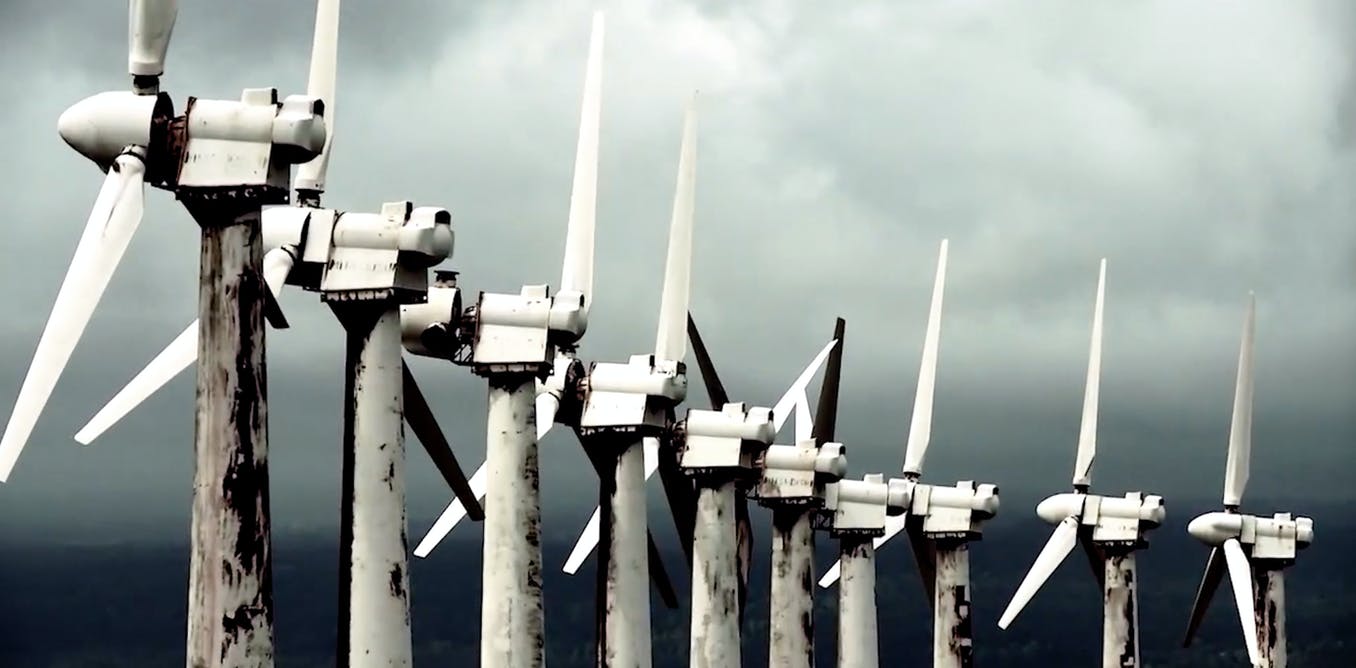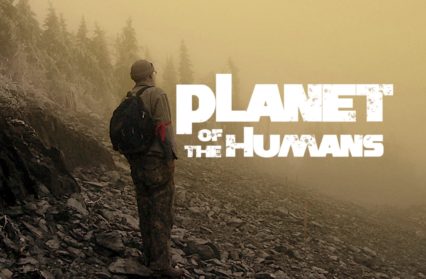Stephen Reed explores the controversy surrounding the 2019 environmental documentary, Planet of the Humans, and asks why the modern environmental movement struggles to make space for controversial voices.
Since its release in 2019, Planet of the Humans has been a source of great controversy and conversation. The environmental documentary written, directed and produced by Jeff Gibbs and promoted by Michael Moore, attempts to look behind the curtain and provide an honest critique of the current global environmental movement. In doing this, Planet of the Humans identifies the flaws of biomass as a renewable energy source and the current inefficiencies of solar and wind among other insights . The overall argument that is cultivated over the hour and forty minutes running time is that green energy production cannot solve the problem at the core of the environmental crisis: humanities resource depletion.
Instead of a focus on new technologies and innovation as a saviour in this crisis, Planet of the Humans puts forward a simple solution: we must all collectively consume less. This means less food, less technology, electricity and all the other commodities that satisfy our modern lives. In this respect it is hard not to agree that this is a well-reasoned answer and that given the current state of our planet, with 2020 on track to be the hottest year since records began, reducing consumption should not be a controversial issue. However, on April 21st 2020, when Moore released Planet of the Humans for free viewing it became a source of heated debate with many arguing that what Gibbs claimed to be a ‘serious conversation about how parts of the environmental movement have gotten into bed with Wall Street and so called “green capitalist”’ was factually incorrect and gave a misleading portrayal of the renewable sector. This debate came to a head only four days later when YouTube temporarily removed the documentary in what Gibbs described as a ‘blatant act of censorship’. YouTube claimed that the removal of the film was due to a copyright infringement claim by photographer Toby Smith over a four-second segment that included one of his photos. While we cannot be sure of YouTube’s motivation in taking the film down, the controversy surrounding this documentary does bring up a larger question: is there space for unconventional voices within environmental movements?

Firstly, it is important to note that this documentary is by no means perfect. It uses some outdated statistics on solar panels suggesting that solar panels are only 8% efficient, a figure that is at least twenty- years old and in fact more recent panels can achieve 15-20% efficiency. Similarly a pie chart used to explain our deficiency in battery storage capacity was found to be off by a factor of a thousand. And thus while these factual inaccuracies reduce the reliability of their message; the overriding sentiment that renewables and batteries are not yet developed enough to meet our current energy demands, remains true.
Planet of the Humans also claims that significant environmentalists such as Bill Mckibben, Al Gore and the Sierra Club are beholden to corporate funding thus undermining their lifelong work and environmental stances. Furthermore the film suggests such figures actively support biomass as a renewable alternative. Though biomass has been historically lauded as a clean, carbon neutral energy source, increasing research has suggested otherwise. For example, studies from the Massachusetts Environmental Energy Alliance found that biomass burning produces 1.5 times more carbon-dioxide than fossil fuels.
Many of the criticisms placed on this documentary seem to follow a rather predictable line of thinking, that because Planet of the Humans doesn’t agree with their doctrine of environmentalism, it is denying the existence of climate change and damaging environmental movements. This narrative was perfectly exemplified in the open letter by filmmaker Josh Fox which claimed that the documentary ‘trades in debunked fossil fuel industry talking points’ and that the filmmakers have done ‘a grave disservice to us and the planet by promoting climate inactivist tropes’. Additionally , an article in VOX claims that the movie undermines the work of young climate activists and that ‘throughout, the filmmaker twists basic facts, misleading the public about who is responsible for the climate crisis.’
To the average person who has taken the time to watch the documentary, it may be difficult to understand how this conclusion was reached. The film runs under the assumption that the viewer is already aware that rampant consumerism and the fossil fuel industry are largely responsible for the climate crisis and reducing consumption is the ultimate solution. Thus the controversy mostly stems from Gibbs and Moore having a different approach to environmentalism that directly conflicts with that of their critics as instead of lauding renewable energy, they are critical of the notion that renewables are the only viable solution to the climate crisis.
Planet of the Humans goes against the current narrative that having anything critical to say about renewables is unhelpful and step backwards in the climate crisis. And thus, censorship of the documentary is ultimately to the benefit of no-one. Yes, of course we should be investing in renewables and energy alternatives but ignoring the areas in which they fall down (i.e. battery storage and efficiency) is like walking into a fight with one hand behind your back. When did criticism become an obstacle to success instead of a challenge to be confronted?
This is an unfortunate pattern that is present in current environmental movements. Take Extinction Rebellion whose overarching aim is to build a more sustainable world. They have been criticised in recent years for using techniques and messaging that is only appealing to people on the left and those already taking environmental action. These tactics are argued as failing to attract a major proportion of society as well as those who do not relate to the ‘rebel like’ mentality. Overall this approach limits the scope of the organisation and a diversification in tactics say through more universal social rituals could tackle this. Since such criticism has been evoked, Extinction Rebellion have reacted with only more extreme protests and acts of civil disobedience such as the blockage of Newsprint’s printer presses in early September, continuing to alienate a significant proportion of society.
In a world where controversy is seen as the primary medium for being heard; whatever your intentions, misplaced criticism of environmental figures or movements, can lead to being labelled as climate change denier or for carrying water for the fossil fuel industries amongst other tropes. This is a problem because if we are to successfully overcome climate change, we will need a unifying movement that can bring everyone together. Ultimately, this poses a question of whether the current environmental movement can accept criticism or more controversial ideas, and if not how can it continue to evolve into an uncertain future?
Stephen Reed is a Biochemistry graduate from Cardiff University with an interest in politics and environmental policy.











